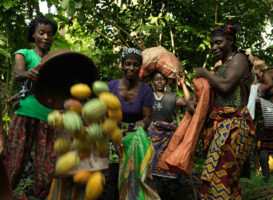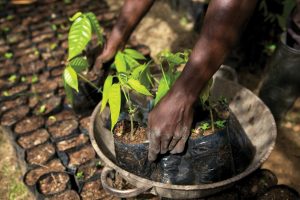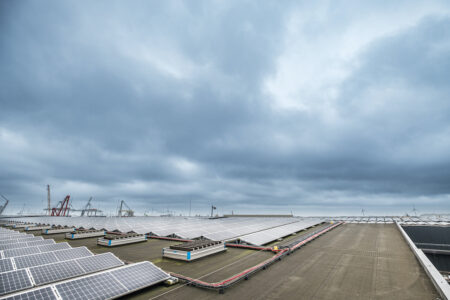Cocoa Barometer study calls for urgent major systemic sector changes

The Voice Network organisation has released its latest biennial Cocoa Barometer report on the cocoa sector, calling for major systemic change with due diligence frameworks, increased farmer payments and delivering enforceable human rights legislation, reports Neill Barston.
According to the industry group of NGO’s and trade unions, these significant issues are among the core collaborative steps required by government, key manufacturers and wider civil society to ensure future sustainability of the value chain serving the multi-billion global confectionery business.
The report’s emergence comes in the wake of studies led by Mondelez International, revealing the $10 billion farmer income gap that exists in key cocoa producing nations of Ghana and Ivory Coast, and underscores a backdrop of major poverty that continues to impact on those working at the heart of the sector.
As the network explained, its mission remains one of being a sector watchdog, with its hard-hitting report claiming that despite two decades of interventions, cocoa farming communities are still contending with the significant effects of poverty, child labour and deforestation.
The barometer highlighted the fact that over the past thirty years, global production of cocoa has doubled, with almost all of this coming from four West African countries (Ivory Coast, Ghana, Cameroon, and Nigeria), with production in West Africa rising from 1.37 million tonnes to 3.47 million tonnes. Consequently, the market share of the big four West African cocoa producers increased from 55% to 74% during that period.
Furthermore the Voice Network believed there was ‘an important window of opportunity’ to move towards justice, as it believed that momentum for change is gathering across different stakeholders. It noted that owing to the campaigning civil society organisations, the last two years have seen an increasing number of chocolate companies asking for regulation; significant global actors like the EU are committed to putting legislation in place; and the world’s two largest producers of cocoa, Ivory and Ghana, have formed a cartel to drive up the price for cocoa farmers.
As the barometer records, within the third quarter of 2019 the Ivorian Conseil du Cafe-Cacao (CCC) and the Ghana Cocoa Board (Cocobod) started with its much anticipated Living Income Differential (LID), an extra fee of $400 per ton of cocoa on top of forward sales for the 2020/21 main crop. Subsequently, in October 2020, Ghana increased the guaranteed cocoa farm gate price for the 2020/2021 season by 28% to $1,837 per tonne, and Côte d’Ivoire by 21% to $1,840, which the network described as a ‘historic initiative and an important step’.

Speaking to Confectionery Production, Antonie C. Fountain, of the VOICE Network, and co-author of the report, stressed his view of the urgency required for widespread action on the key issues facing the sector.
He said: “After two decades of voluntary initiatives that do not tackle the root causes, it is time for systemic change in the sector.
“All the ingredients are there to make it work, but it is now time to move forward, and put in place ambitious, holistic and mandatory change, so that we can finally tackle the poverty, child labour and deforestation in cocoa. We’re going to do a series of deep dive webinars starting in January, where we’re going to unpack some of the issues in much lore detail, allowing several other voices to joint the conversation and add learning.
“Also; it’s going to be essential that we find a balance between the necessary systemic long term changes on the one hand, and the equally necessary short term steps on the other. We can’t afford to wait a generation for diversified income and supply management and holistic rural development strategies to kick in. While they are being developed we urgently need higher prices, regulatory frameworks, and much more transparency and traceability in the sector, and we’re going to need that almost overnight.”
Report recommendations
The report said it was vital that the sector learns from mistakes and past experience, identifying three main areas that in its view, sustainability has failed to be delivered over the past two decades.
First, as the report notes, efforts have only been voluntary, not mandatory, meaning that across the sector, actors are failing to do what they need to. Within the multitude of government-driven covenants, national multi-stakeholder platforms and sector-wide collaborations, there are no penalties for noncompliance from companies or governments, nor enforcement to meet targets.
Conversely, it added that cocoa farmers themselves, many of whom are living below poverty line conditions, run the risk of losing their sustainable cocoa certification if they do not comply. The report noted that there had been an encouraging rise in regulatory processes and commitments to due diligence, yet asserted that these require accountability and enforcement.
Second, whilst bad farming practice has been addressed, the underlying problems that exacerbate extreme poverty – including low cocoa prices, lack of infrastructure and no transparency and accountability as you move higher in the supply chain – remain unchallenged and unsolved. There needs to be recognition that in its current form, the business model for high yields of cocoa means poverty for farmers and excessive profit for chocolate manufacturers. It’s time this changed.
The third aspect identified by the report was that in its view, efforts to solve complex issues of injustice and unsustainability in the cocoa sector have not been inclusive or holistic enough. Instead of inviting farmers and civic society to take a respected seat at the decision-making table, problems have been assessed using a top-down industry-based approach. This serves the interests of industry and government, rather than the producer farmers and their communities.

“We are at the crossroads” says Isaac Gyamfi, managing director for Solidaridad in West Africa. “Do we continue skirting around the issue of farmers wellbeing, or will all stakeholders together radically redesign value distribution and decision making in the cocoa sector? Let’s make space at the table and assure a living income, for both farmers and workers”.
Acknowledging how previous interventions have failed points us to alternative pathways that can put an end to deforestation, poverty and human rights abuses in cocoa supply chains. The report makes three key recommendations:
1. Regulation that changes the system, rather than penalising the farmers
Recognising that bad farming is not the problem, but rather a symptom of a deeply unfair system, the report advocates for systems change and regulation that creates an enabling environment. Current forms of certification and farm-based standards increase pressure on farmers: instead, we need laws that hold the powerful accountable, rather than systems that demand farmers to solve systemic issues. Compliance criteria are imbalanced and need restructuring so that companies are held accountable to due diligence systems.
2. Effective partnerships between producer and consumer countries
We need partnership agreements between producer and consumer countries that facilitate and finance system change, ensuring the right policies are in place. Processes that set partnerships in motion should be inclusive and deliberative, ensuring that civil society and farmer groups have a respected voice at decision-making tables.
3. Deliver on a fair price for farmers
The single biggest positive impact for farmers and incentive for farming sustainably is delivering a fair price for the cocoa they produce. Cocoa and chocolate companies must find ways to redistribute value along the supply chain so that farmers are guaranteed a living income.
Sandra Sarkwah, Coordinator for the Ghana Civil-Society Cocoa Platform (GCCP), supports the publication of the Cocoa Barometer 2020. “Efforts of sector players to change the story of farmers keep on beating about the bush when evidence presents to us the plight of farmers, thus, low income from their hard work is a major threat to cocoa sustainability” she said.
“Processors, chocolate manufacturing companies and retailers who earn a large chunk from the value chain must be fair to farmers by paying a living income and this must reach the farmer”. As recommended in the report, Sarkwah confirms “this will require the efforts of various actors, including civil society organisations in both producing and consuming countries, as well as strong farmer cooperatives to demand transparency and accountability for effective delivery of pricing policies for better farm gate prices for farmers”.
- The Cocoa Barometer report can be see in full at www.voicenetwork.eu



